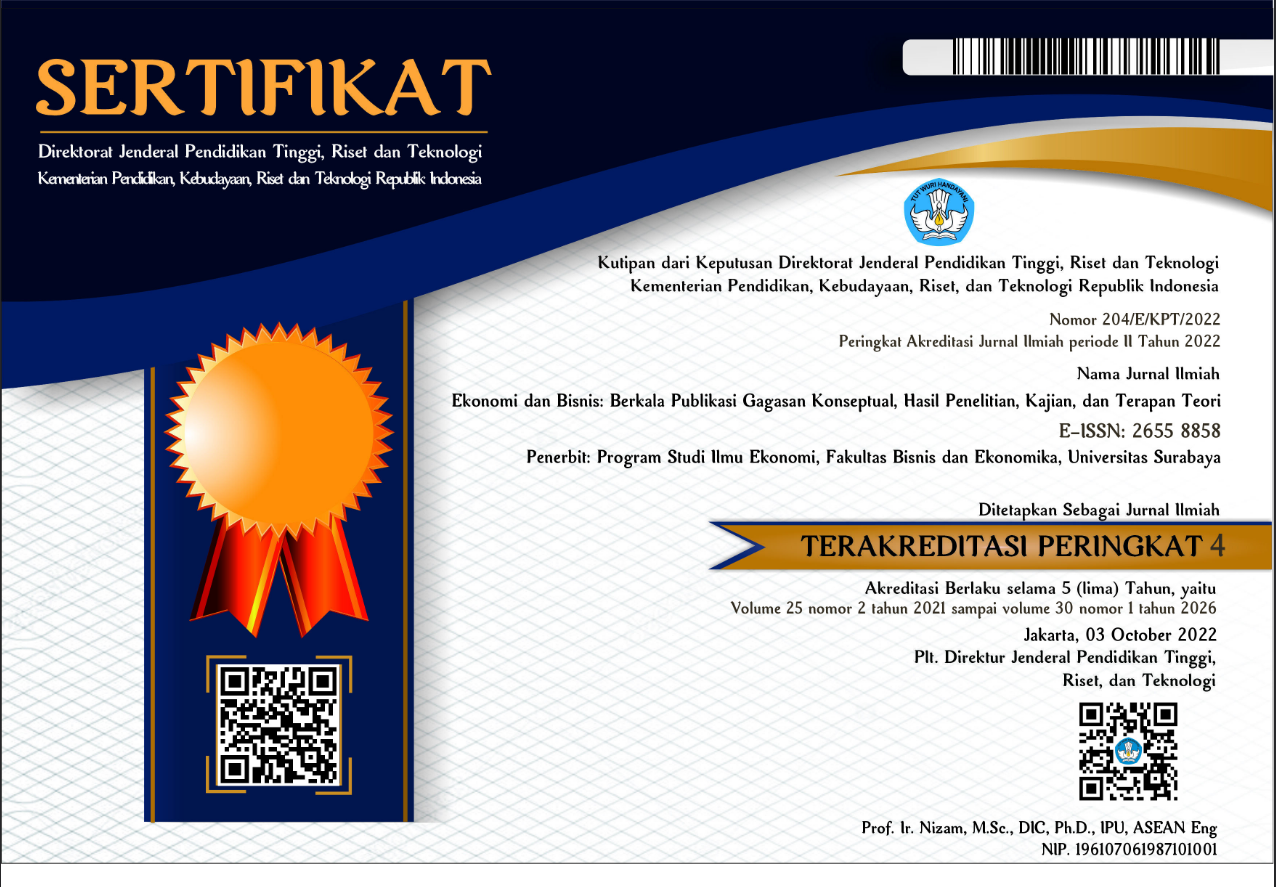PERAN MEDIASI MODERASI BURNOUT DAN PSYCHOLOGICAL CAPITAL PADA PENINGKATAN JOB PERFORMANCE
 Abstract Views:
593 times
Abstract Views:
593 times
 PDF (Bahasa Indonesia) Downloads:
502 times
PDF (Bahasa Indonesia) Downloads:
502 times
Abstract
This study aims to explore and analyze the impact of emotional intelligence and employee engagement on job performance, with psychological capital and burnout as moderation. A descriptive quantitative method with a causal perspective is used in this investigation. A sample of 110 respondents was employed for the research theme on employees at PT. Luhai Industrial Cikande Serang. The questionnaire's responses were scored on a scale from 1 to 10. Data was processed and evaluated using SmartPLS version 3.29. The findings of this research shown 1). Emotional intelligence does not significantly affect job performance. 2). Employee engagement has a huge positive impact on job performance. 3). Emotional intelligence has a large positive effect on psychological capital. 4). Psychological capital has a large positive effect on job performance. 5). Psychological capital can mediate the impact of emotional intelligence on job performance. 6). Burnout strengthens the relationship between employee engagement and job performance. 7). Burnout weakens the relationship between psychological capital and job performance.
Downloads
References
Alefari, M., Fernández Barahona, A. M., & Salonitis, K. (2018). Modelling manufacturing employees’ performance based on a system dynamics approach. Procedia CIRP, 72, 438–443. https://doi.org/10.1016/j.procir.2018.03.161
Chu, K. H., Baker, M. A., & Murrmann, S. K. (2012). When we are onstage, we smile: The effects of emotional labor on employee work outcomes. International Journal of Hospitality Management, 31(3), 906–915. https://doi.org/10.1016/j.ijhm.2011.10.009
Cohen, A., & Abedallah, M. (2015). The mediating role of burnout on the relationship of emotional intelligence and self-efficacy with OCB and performance. Management Research Review, 38(1), 2–28. https://doi.org/10.1108/MRR-10-2013-0238
Ferdinand, A. (2018). Metode Penelitian Manajemen Pedoman Penelitian untuk Penulisan Skripsi, Tesis, dan Disertasi Ilmu Manajemen (5 ed.). . Seri Pustaka Kunci. BP Undip.
Ghozali, I., & Latan, H. (2015). Partial Least Squares Konsep, Teknik, dan Aplikasi Menggunakan Program SmartPLS 3.0 (2 ed.). Undip.
Goertzen, B. J., & Whitaker, B. L. (2015). Development of psychological capital in an academic-based leadership education program. Journal of Management Development, 34(7), 773–786. https://doi.org/10.1108/JMD-07-2013-0100
Gong, Z., Chen, Y., & Wang, Y. (2019). The Influence of Emotional Intelligence on Job Burnout and Job Performance: Mediating Effect of Psychological Capital. Frontiers in Psychology, 10, 2707. https://doi.org/10.3389/fpsyg.2019.02707
Grobelna, A. (2019). Effects of individual and job characteristics on hotel contact employees’ work engagement and their performance outcomes: A case study from Poland. International Journal of Contemporary Hospitality Management, 31(1), 349–369. https://doi.org/10.1108/IJCHM-08-2017-0501
Ismail, H. N., Iqbal, A., & Nasr, L. (2019). Employee engagement and job performance in Lebanon: The mediating role of creativity. International Journal of Productivity and Performance Management, 68(3), 506–523. https://doi.org/10.1108/IJPPM-02-2018-0052
Jex, S. M., & Britt, T. W. (2014). Organizational psychology: A scientist-practitioner approach (Third edition). John Wiley & Sons, Inc.
Khosravi, P., Rezvani, A., & Ashkanasy, N. M. (2020). Emotional intelligence: A preventive strategy to manage destructive influence of conflict in large scale projects. International Journal of Project Management, 38(1), 36–46. https://doi.org/10.1016/j.ijproman.2019.11.001
Kong, F., Tsai, C.-H., Tsai, F.-S., Huang, W., & de la Cruz, S. (2018). Psychological Capital Research: A Meta-Analysis and Implications for Management Sustainability. Sustainability, 10(10), 3457. https://doi.org/10.3390/su10103457
Kotze, M. (2018). How job resources and personal resources influence work engagement and burnout. African Journal of Economic and Management Studies, 9(2), 148–164. https://doi.org/10.1108/AJEMS-05-2017-0096
Luthans, F., & Youssef, C. M. (2004). Human, Social, and Now Positive Psychological Capital Management: Organizational Dynamics, 33(2), 143–160. https://doi.org/10.1016/j.orgdyn.2004.01.003
Luthans, F., Youssef, C. M., & Avolio, B. J. (2007). Psychological Capital: Developing the Human Competitive Edge. Oxford University Press.
Melnyk, S. A., Bititci, U., Platts, K., Tobias, J., & Andersen, B. (2014). Is performance measurement and management fit for the future? Management Accounting Research, 25(2), 173–186. https://doi.org/10.1016/j.mar.2013.07.007
Molino, M., Cortese, C. G., & Ghislieri, C. (2020). The Promotion of Technology Acceptance and Work Engagement in Industry 4.0: From Personal Resources to Information and Training. International Journal of Environmental Research and Public Health, 17(7), 2438. https://doi.org/10.3390/ijerph17072438
Mone, E. M., & London, M. (2018). Employee Engagement Through Effective Performance Management: A Practical Guide for Managers (2 ed.). Routledge. https://doi.org/10.4324/9781315626529
Moyer, F., Aziz, S., & Wuensch, K. (2017). From workaholism to burnout: Psychological capital as a mediator. International Journal of Workplace Health Management, 10(3), 213–227. https://doi.org/10.1108/IJWHM-10-2016-0074
Nurcahyo, R., & Wibowo, A. D. (2015). Manufacturing Capability, Manufacturing Strategy and Performance of Indonesia Automotive Component Manufacturer. Procedia CIRP, 26, 653–657. https://doi.org/10.1016/j.procir.2014.07.046
O’Boyle, E. H., Humphrey, R. H., Pollack, J. M., Hawver, T. H., & Story, P. A. (2011). The relation between emotional intelligence and job performance: A meta-analysis. Journal of Organizational Behavior, 32(5), 788–818. https://doi.org/10.1002/job.714
Pradhan, R. K., Jena, L. K., & Bhattacharya, P. (2016). Impact of psychological capital on organizational citizenship behavior: Moderating role of emotional intelligence. Cogent Business & Management, 3(1), 1194174. https://doi.org/10.1080/23311975.2016.1194174
Rich, B. L., Lepine, J. A., & Crawford, E. R. (2010). Job Engagement: Antecedents and Effects on Job Performance. Academy of Management Journal, 53(3), 617–635. https://doi.org/10.5465/amj.2010.51468988
Salendu, A., & Maldini, M. F. (2021). Ketidakamanan pekerjaan dan kinerja tugas: Peran burnout sebagai mediator. Jurnal Ilmiah Psikologi Terapan, 9(2), 150–155. https://doi.org/10.22219/jipt.v9i2.14485
Salanova, M., Llorens, S., & Cifre, E. (2013). The dark side of technologies: Technostress among users of information and communication technologies. International Journal of Psychology, 48(3), 422–436. https://doi.org/10.1080/00207594.2012.680460
Santhanam, N., & Srinivas, S. (2020). Memodelkan dampak keterlibatan dan kebahagiaan karyawan pada burnout dan intensi turnover di antara pekerja kerah biru di perusahaan manufaktur. Emerald Publishing Limited.
Sembiring, N., Nimran, U., Astuti, E. S., & Utami, H. N. (2020). The effects of emotional intelligence and organizational justice on job satisfaction, caring climate, and criminal investigation officers’ performance. International Journal of Organizational Analysis, 28(5), 1113–1130. https://doi.org/10.1108/IJOA-10-2019-1908
van Beek, I., W. Taris, T., B. Schaufeli, W., & Brenninkmeijer, V. (2013). Heavy work investment: Its motivational make-up and outcomes. Journal of Managerial Psychology, 29(1), 46–62. https://doi.org/10.1108/JMP-06-2013-0166

This work is licensed under a Creative Commons Attribution-ShareAlike 4.0 International License.

 DOI:
DOI:















